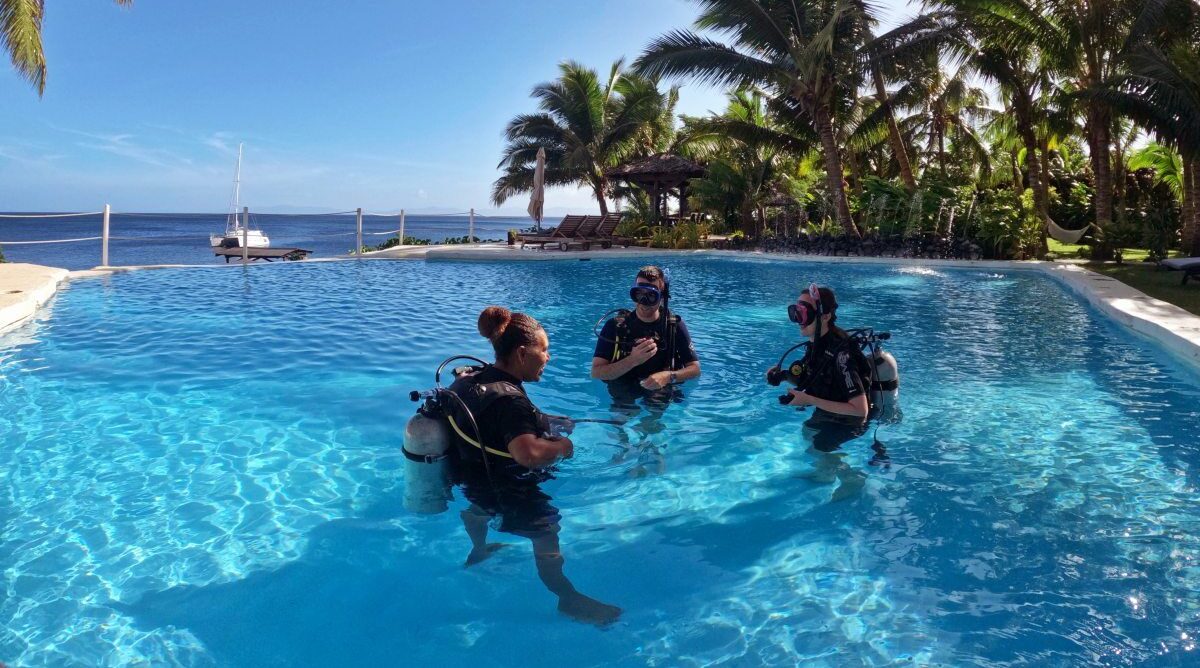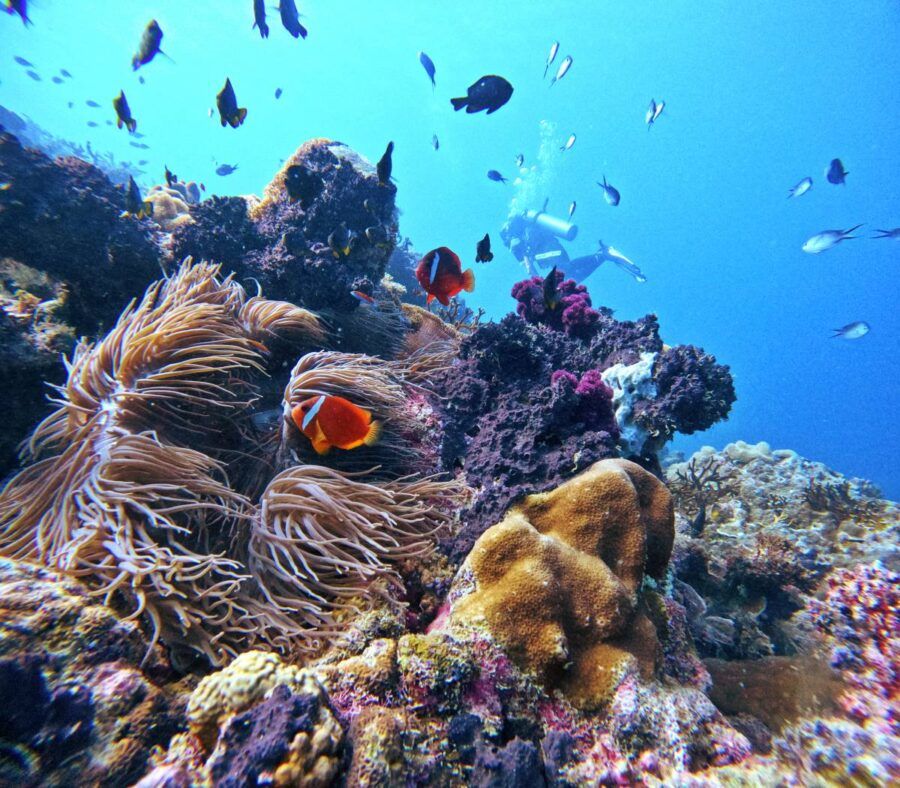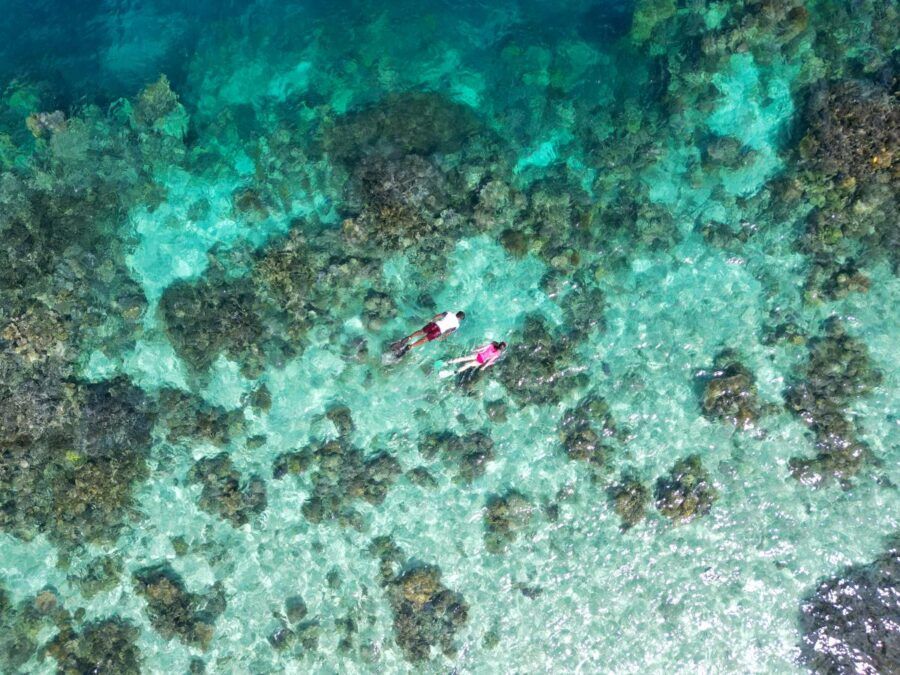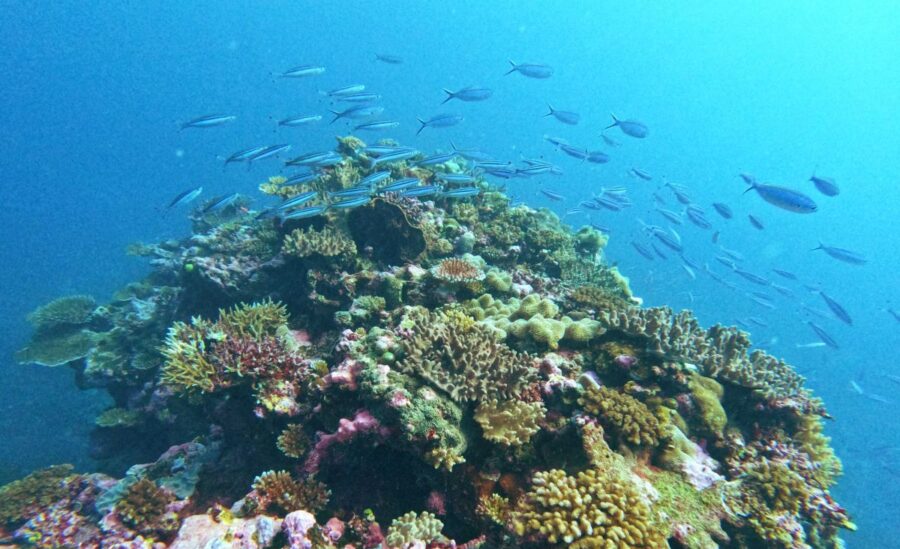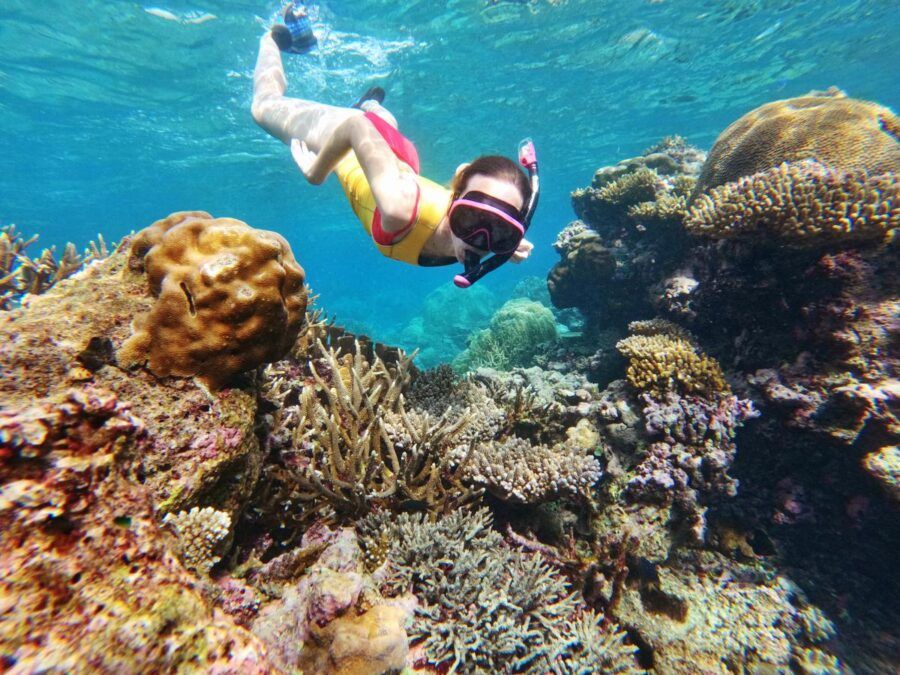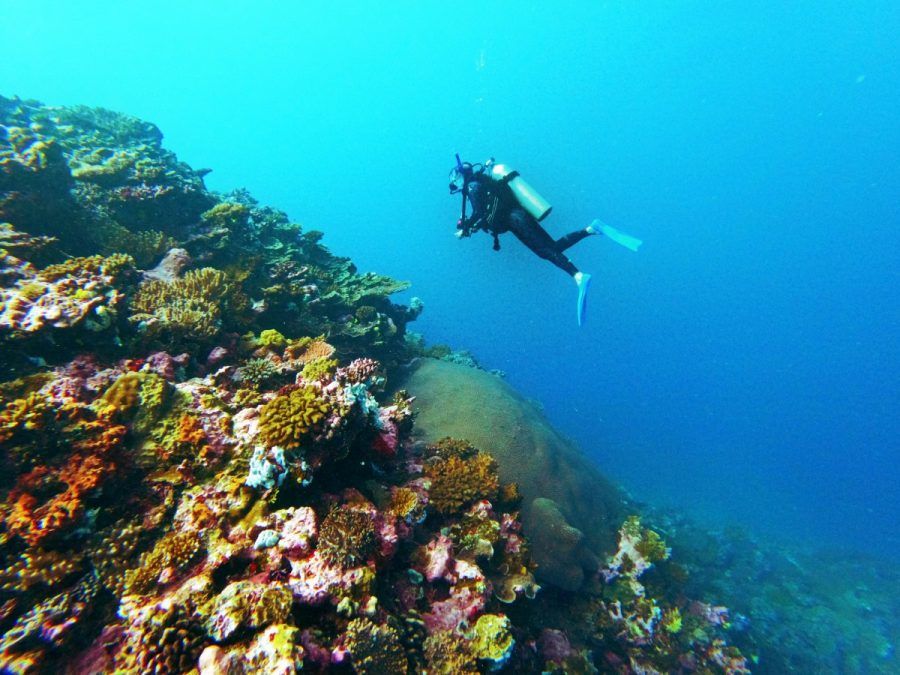How to Get Your Scuba Diving Certification in Fiji
You’ve probably seen videos or pictures of unusual underwater worlds of corals and fish of all shapes, sizes and colours. Now it’s time to take the leap into the depths of Fiji’s waters to find your own slice of underwater heaven.
Find out where to learn this eye-opening sport in this guide on how to learn to scuba dive in Fiji!
Scuba diving in Fiji is truly amazing, thanks to its wonderful array of soft corals, which harbour a diverse range of life and keep the water exceptionally clear. For beginners, there are island groups with sheltered waters, as well as exciting and unique experiences, like diving nose-to-nose with sharks!
Fiji has an abundance of PADI (Professional Association of Diving Instructors) Dive Centres, as well as SSI (Scuba Schools International) Dive Centres where dive schools in Fiji are accredited to an international standard to ensure you get the best safety training to learn how to dive.
Table of Contents
10 Reasons to Learn How to Dive in Fiji
As if you need a reason to learn how to dive in Fiji! It’s Fiji! But if you’re still sceptical that this island paradise is the right place to learn, then these points should help you see the light…
- Fiji is the “Soft Coral Capital of the World”, so saying that there is plenty to see underwater is an understatement!
- Fiji has a fantastic array of PADI and SSI-accredited dive centres.
- The water temperature averages a comfortable 25°C (77°F)
- Stay on a gorgeous tropical island while you learn.
- Visibility is usually around 30 m (32.8 yards)!
- Scuba diving in Fiji is available all year round with very few dive centres closing down for the tourist low season.
- There’s so much to see underwater, with around 1,200 varieties of fish and around 370 coral species in Fiji.
- There’s a huge choice of destinations to learn how to dive in Fiji – just see The Best Places to Learn How to Dive in Fiji!
- You can learn to dive while cruising the Fiji islands – check out 5 Best Liveaboards in Fiji.
- Plus, there’s so much more to do in Fiji between dives – explore our 101 Things to Do in Fiji!
These incredible features make Fiji a dream destination for scuba diving enthusiasts and beginners alike. Keep reading this guide to discover more about the underwater wonders and diving opportunities that await you in Fiji!
 © FijiPocketGuide.com
© FijiPocketGuide.comPADI or SSI in Fiji?
PADI (Professional Association of Diving Instructors) and SSI (Scuba Schools International) are two of the world’s most recognised scuba diving organisations. Both have a huge presence across Fiji, meaning that if you do a course with PADI or SSI-accredited dive centres and resorts, then your certificate will be recognised internationally.
Both PADI and SSI also have high standards when it comes to safety, which is absolutely essential for any diver, not just beginners. What’s more, if you don’t finish your scuba diving course at one dive centre in Fiji, you can pick up where you left off at another dive centre in Fiji, as long as it’s the same accreditation.
In terms of the availability and popularity of dive centres around the world, should you want to go further with your accreditation, PADI is the most popular then SSI.
Check out some of the best resorts around Fiji with dive centres in the 10 Best Dive Resorts in Fiji.
 © FijiPocketGuide.com
© FijiPocketGuide.comWhere to Learn to Scuba Dive: Nadi, Denarau and the Mamanuca Islands
Easy to get to, within sheltered clear waters, home to several coral reefs, and surrounded by a dizzying array of dive shops, the Mamanuca Islands is an easy choice for beginners!
The Mamanuca Islands is an island group just off the coast of Fiji’s arrival city, Nadi. That means that resorts and independent dive shops based in Nadi, Denarau and the island resorts of the Mamanucas all service the dive sites of the Mamanuca Islands. What’s more, dive sites are rarely more than 20 minutes boat journey from the base.
The Best Dive Operators in Nadi and Denarau
These are the dive shops and operators in Nadi and Denarau that feature their own PADI and SSI dive operations, offering lessons for beginners and introductory dives.
- Purple Turtle (Denarau)
- Whitetip Marine Adventures (Denarau)
- Viti Water Sports (Nadi)
- Hauraki Adventures (Nadi/Denarau)
Learn more about what else there is to do in the area with The Complete Travel Guide to Nadi and The Complete Travel Guide to Denarau Island.
The Best Dive Resorts and Operators in the Mamanuca Islands
These are the resorts in the Mamanuca Islands that feature their own PADI or SSI dive operations, offering lessons for beginners and introductory dives.
- Ratu Kini Dive Resort
- Castaway Island Resort
- VOMO Island Resort
- Nakelo Treasure Island Resort
- Matamanoa Island Resort (via Purple Turtle)
- Subsurface Fiji (works with most resorts in the Mamanuca Islands)
Learn more about what else there is to do in the Mamanuca Islands with The Complete Guide to the Mamanuca Islands.
Learn to Dive on a Sailing Liveaboard
Embark on an unforgettable underwater adventure with Big Blue Fiji, a sailing catamaran charter boasting its own SSI dive shop. Setting sail from Denarau, this unique experience takes you through the stunning Mamanucas, Yasawas, or even further afield, depending on your itinerary.
Combining the thrill of sailing with world-class diving opportunities, it’s the perfect way to explore Fiji’s marine wonders. For more details on this and other exceptional liveaboard experiences, check out our guide to the 5 Best Liveaboards in Fiji.
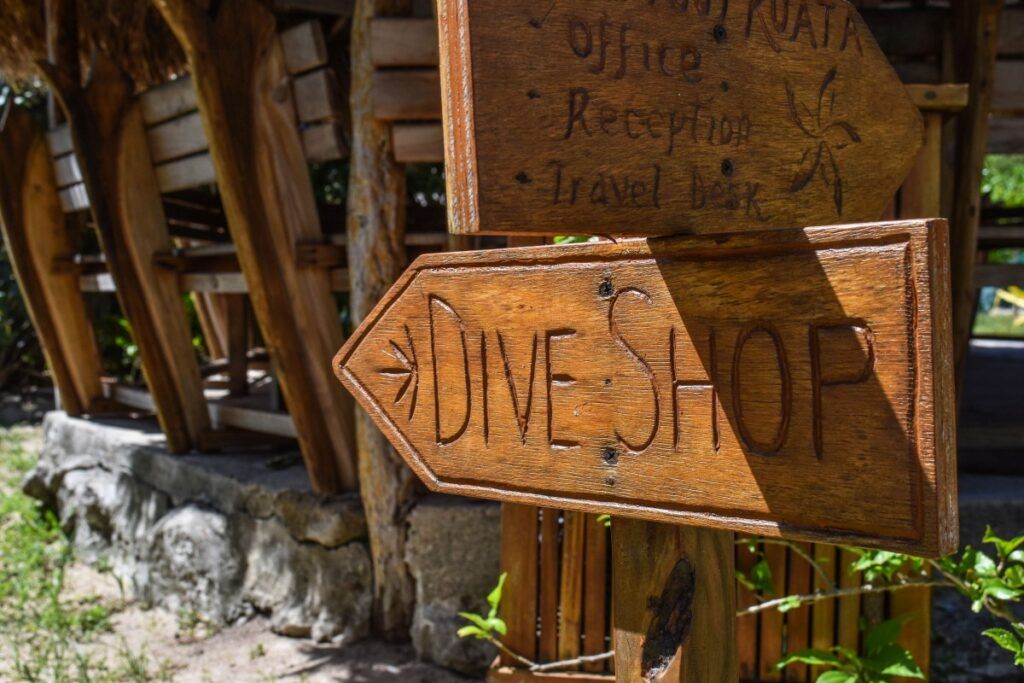 © FijiPocketGuide.com
© FijiPocketGuide.comWhere to Learn to Scuba Dive: Yasawa Islands
While the Yasawa Islands might not be the first choice for experienced divers, it has perfect conditions for beginners learning to dive in Fiji! What’s more, there are plenty of resorts with their own on-site dive shops, meaning you can easily spend at least the four days required to complete your Open Water course.
What’s more, it’s paradise. The remote and scenic islands evoke the charm of the “real Fiji”, with dramatic volcanic peaks, golden-sand beaches and vibrant waters, making them a pretty stunning place to learn how to dive.
There are shallow coral reefs and interesting underwater rock formations for beginners to enjoy in the Yasawa Islands. One of the most popular is Lekima’s Ledge, an underwater cliff off Vawa Island.
The Best Dive Resorts in the Yasawa Islands
These are the resorts in the Yasawa Islands with their own dive operations, including courses and introductory dives. Here’s where you can base yourself to complete your scuba diving courses in the Yasawas.
- Mantaray Island Resort
- Yasawa Island Resort & Spa
- Barefoot Kuata Resort
- Barefoot Manta Resort
- Vertical Blue Divers (services Octopus, Paradise Cove, Navutu Stars and Blue Lagoon resorts)
- Dive Yasawa Lagoon (based at Coralview Island Resort)
- Turtle Island Resort
- Viwa Island Resort
Learn more about what else there is to do in the Yasawa Islands with The Complete Guide to the Yasawa Islands.
 © FijiPocketGuide.com
© FijiPocketGuide.comWhere to Learn to Scuba Dive: Savusavu and Vanua Levu
If you’re looking to hit one of the best areas for scuba diving in Fiji, then Savusavu on the island of Vanua Levu is definitely an option! Big-name dive sites, such as The Zoo in Natewa Bay and Chimneys in the Namena Marine Reserve surround Fiji’s second-largest island.
If you’ve done any research into scuba diving in Fiji, chances are you will have seen dive sites mentioned around Vanua Levu.
But is Savusavu suitable for beginners? Absolutely! Savusavu has its own array of resorts with PADI dive centres. While you might not be qualified to do some of the most famous dives of the area, there are still plenty of opportunities to learn and see some spectacular sites in the process, especially in the Namena Marine Reserve and Natewa Bay.
The Best Dive Resorts and Operators in Savusavu
The following resorts have their own dive operations or work with local PADI dive centres, where you can start your Open Water course at the resort! There are also scuba diving and freediving operators based in Savusavu town.
- Ocean Ventures
- Liquidstate Freediving (freediving courses only)
- Jean-Michel Cousteau Resort
- Dive For Life (operating out of Koro Sun Resort)
- KoroSun Dive (operating out of Savasi Island Resort)
- Namale Resort & Spa
Learn more about what else there is to do on Vanua Levu with The Complete Guide to Savusavu & Vanua Levu.
 © FijiPocketGuide.com
© FijiPocketGuide.comWhere to Learn to Scuba Dive: Taveuni and Eastern Vanua Levu
We’re back on Vanua Levu, but this time, we’re exploring its remote southeastern side, which borders the famous Somosomo Strait. This area is home to the legendary Rainbow Reef, perhaps the biggest name in Fiji scuba diving.
Across the strait, you’ll find Taveuni, an island brimming with dive resorts and operators ready to help you earn your certification. If you’re looking to learn scuba diving, this is the place to go big or go home.
It’s not just the best place to learn; it’s a destination that even qualified divers envy.
The Best Dive Resorts and Operators in Vanua Levu and Taveuni
The following resorts have their own dive operations or work with local PADI dive centres, where you can start your Open Water course at the resort!
- Dive Academy at Viani Bay Resort (Vanua Levu)
- The Remote Resort (Vanua Levu)
- Paradise Taveuni (Taveuni)
- Garden Island Resort (Taveuni)
- Taveuni Ocean Sports (Taveuni)
- Salt Diver Taveuni (Taveuni)
- Sau Bay Resort & Spa (Vanua Levu)
- Taveuni Dive Resort (Taveuni)
- Dolphin Bay Divers Retreat (Vanua Levu)
Learn more about what else there is to do in the area with The Complete Travel Guide to Taveuni and The Complete Guide to Savusavu & Vanua Levu.
 © FijiPocketGuide.com
© FijiPocketGuide.comWhere to Learn to Scuba Dive: Pacific Harbour and Beqa
Forget overwater travel to a remote offshore island. The Pacific Harbour is on Fiji’s main island, Viti Levu, just 2 hrs 30 mins drive from Nadi and 40 minutes from Suva, making it a cheaper destination to learn how to dive in Fiji.
But that’s not the only reason that you might want to learn to dive here, as one of the world’s largest barrier reefs, the Beqa Lagoon, is just off its shores.
While the Beqa Lagoon has an amazing array of soft corals and colourful tropical fish, one of the exciting dives you can do as a beginner is at the Shark Reef Marine Reserve! That’s right, you can dive with large bull sharks for a real adrenaline experience.
The Best Dive Resorts and Operators on the Pacific Harbour and Beqa
While the islands around the Beqa Lagoon have resorts with their own dive centres, resorts in Pacific Harbour work with dive shops in the area like Aqua-Trek. Here are some resorts where you can learn how to dive…
- Aqua-Trek (based at The Pearl Resort)
- Coral Coast Divers
- Beqa Adventure Divers
- Beqa Lagoon Resort
- Royal Davui Island Resort
- Waidroka Bay Resort
Learn more about what else there is to do on the Pacific Harbour and Beqa with The Complete Guide to Pacific Harbour & Beqa.
 © FijiPocketGuide.com
© FijiPocketGuide.comWhere to Learn to Scuba Dive: Kadavu
Kadavu is the final frontier of scuba diving in Fiji. Imagine starting your diving career in one of the least visited and untouched places to dive in the country! Harboured by the Great Astrolabe Reef, Kadavu boasts stunning dive sites where you’ll have the chance to see manta rays, eagle rays, sharks, and turtles on your first few dives.
This remote and quiet destination ensures you’ll have all the attention on you for dive lessons. It’s the perfect place to begin your underwater adventures!
For a taste of what awaits you, check out examples of dive sites in our guide to the 10 Best Dive & Snorkel Sites on the Great Astrolabe Reef.
The Best Dive Resorts in Kadavu
Kadavu’s few resorts have their very own dive school. Here are some resorts where you can learn how to dive…
- Matava Eco Adventure Resort
- Papageno Resort
- Kokomo Private Island
- Oneta Resort
Learn more about what else there is to do in Kadavu with The Complete Travel Guide to Kadavu.
 © FijiPocketGuide.com
© FijiPocketGuide.comWhere to Learn to Scuba Dive: Suncoast
The final region we’re going to explore is the northern part of the mainland: the Suncoast. This easy-to-reach road-trip destination is a diver’s paradise, bordering the Bligh Water and Vatu-i-Ra Passage. You’ll be amazed by the nutrient-rich waters that nourish gorgeous pinnacles and underwater coral formations.
Whether you’re a beginner or an experienced diver, the Suncoast offers some of the most spectacular diving in Fiji. Don’t miss the chance to explore its vibrant marine life and stunning underwater landscapes.
For more information on the best spots to dive in this region, check out our guide to the 10 Best Dive Sites on the Suncoast.
The Best Dive Resorts and Operators on the Suncoast
The Suncoast may have limited dive operators, but it’s home to one of Fiji’s only Fijian-owned operators, while the Ra Divers is a prestigious name in Fiji diving.
- Ra Divers (based at Volivoli Beach Resort)
- Ring Gold Divers
Learn more about what else there is to do on the Suncoast with The Complete Travel Guide to Lautoka, Rakiraki & the Suncoast.
Learn to Dive on a Liveaboard on the Suncoast
Liveaboards are a great way to get to uncrowded dive sites around Fiji, making it a popular option for experienced divers. Beginners can also get this experience by using the onboard PADI centre on Nai’i! The liveaboard cruises to various scuba diving destinations along the Bligh Water.
For more information on liveaboards, see the 5 Best Liveaboards in Fiji.
 © FijiPocketGuide.com
© FijiPocketGuide.comThe Cost of Scuba Diving Lessons in Fiji
The cost of learning to scuba dive in Fiji is pretty reasonable, especially when many resorts offer dive and accommodation packages. The typical cost for scuba diving certifications in Fiji is as follows:
- PADI Discover Scuba (intro dive): FJ$300-$500
- PADI Scuba Diver (1.5 days): FJ$1,000
- PADI Open Water Diver (4 days): FJ$1,500-$1,700 (including e-learning)
- SSI Open Water Diver (4 days): FJ$950-$1,480 (including e-learning)
Please note that the prices stated above typically include dive gear. While you may see cheaper prices advertised, these may not include the gear.
 © FijiPocketGuide.com
© FijiPocketGuide.comWhat Will You See When Learning to Dive in Fiji?
Fiji has rightfully earned the title of “Soft Coral Capital of the World”. For non-divers, that might not mean much now, but it essentially means that the underwater landscape in Fiji is amazing.
Soft corals are basically corals that don’t have skeletons, so often resemble trees or plants. With that, they harbour a whole ecosystem of diverse life.
One of the most extreme examples is the Namena Marine Reserve off Vanua Levu, where you can find around 400 types of corals, 450 types of marine plants, more than 1,000 types of invertebrates, and approximately 1,100 species of fish. Learn more about Vanua Levu later in this guide.
In short, Fiji has around 1,200 varieties of fish and around 370 species of coral. Every moment when scuba diving offers something new and exciting to see! Fish species include bumphead parrotfish, Maori wrasse, lionfish, sweetlips, and so much more.
Larger marine species can also be seen while diving, with around seven species of turtles, 12 species of whales, nine species of sharks and giant manta rays residing in Fiji’s waters.
 © FijiPocketGuide.com
© FijiPocketGuide.comWater Temperature and Visibility
Fiji is a comfortable place to learn how to scuba dive thanks to the warm sea temperatures experienced all year round. The average sea temperature is around 25°C (77°F), which is very comfortable to scuba dive in.
You’ll be kitted out with comfortable 5 mm wetsuits, which often feel much easier to move around than thick ones, while shortie wetsuits are also an option.
Learn more about the average sea temperatures for each month in What is the Weather Like in Fiji?
What about the visibility of the water in Fiji? Well, you know all of that soft coral we were talking about? That helps keep Fiji’s waters unbelievably clear, in part. Nothing ruins a scuba diving trip quite like murky waters, but that’s rarely an issue in Fiji with the average visibility being around 30 m (32.8 yards)!
 © FijiPocketGuide.com
© FijiPocketGuide.comThe Best Time to Learn How to Scuba Dive in Fiji
Scuba diving in Fiji is available all year round with very few dive centres closing down for the tourist low season. So beginners can learn how to dive in Fiji whenever the time feels right!
However, those who are being picky could argue that the Fiji dry season (April to October) is the best time to learn how to scuba dive when there is less surface runoff from the islands after heavy rain, which can impact visibility.
Find out more about the seasons for scuba diving in When is the Best Time to Dive in Fiji?
More About Places to Learn How to Scuba Dive in Fiji
That’s it for our guide to places to learn how to scuba dive in Fiji; for more information about scuba diving in Fiji, check out the following articles:
Finally, if there’s anything we’ve missed, you’re likely to find it in The Complete Guide to Scuba Diving in Fiji.
Sources:
The information in this guide has been compiled from our extensive research, travel and experiences across Fiji and the South Pacific, accumulated over more than a decade of numerous visits to each destination. Additional sources for this guide include the following:
- Tourism Fiji (General travel advice - Updated [2025])
- Fiji Hotel and Tourism Association (Tourism trade association - Updated [2025])
- SPTO (Pacific tourism advice - Updated [2025])
- Ministry of Tourism and Civil Aviation (Tourism statistics - Updated [2025])
- Land Transport Authority (Road safety advice - Updated [2025])
- Fiji Immigration (Visa and immigration advice - Updated [2025])
- Fiji Revenue & Customs Service (Customs and visitor taxes - Updated [2025])
- Biosecurity Authority of Fiji (Biosecurity advice - Updated [2025])
- Fiji Meteorological Service (Weather forecast and warnings - Updated [2025])
- Fiji Bureau of Statistics (Statistics and travel data - Updated [2025])
- Safe Travel (New Zealand travel advisory for Fiji - Updated [2025])
- Smart Traveller (Australia travel advisory for Fiji - Updated [2025])
- Travel.State.Gov (U.S. travel advisory for Fiji - Updated [2025])
Our editorial standards: At Fiji Pocket Guide, we uphold strict editorial standards to ensure accurate and quality content.

About The Author
Robin (Ruveni) C.
This article was reviewed and published by Robin, the co-founder of Fiji Pocket Guide. He has lived, worked and travelled across 16 different countries before settling in the South Pacific, so he knows a thing or two about planning the perfect trip in this corner of the world. Robin is also the co-founder of several other South Pacific travel guides and is a regular host of webinars with the South Pacific Tourism Organisation.

